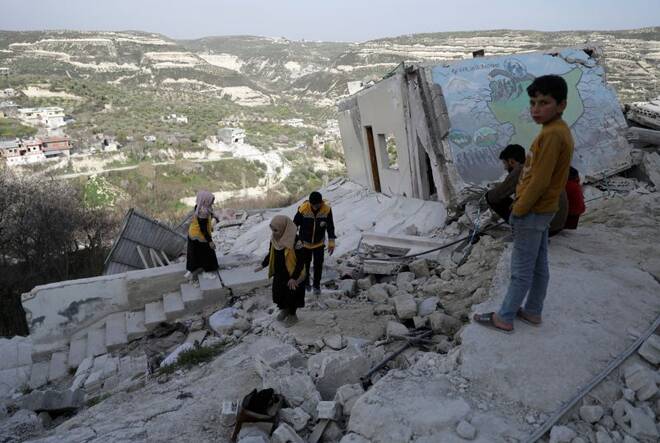Advertisement
Advertisement
World Bank estimates Syria’s three-year earthquake recovery needs at $7.9 billion
By:
WASHINGTON (Reuters) - The World Bank on Monday said February earthquakes are expected to have caused Syria's real GDP output to contract by 5.5% in 2023, with recovery and reconstruction needs estimated at $7.9 billion over three years.
By David Lawder
WASHINGTON (Reuters) – The World Bank on Monday said the February earthquakes are expected to have caused Syria’s real GDP output to contract by 5.5% in 2023, with recovery and reconstruction needs estimated at $7.9 billion over three years.
The World Bank said its Rapid Damage and Needs Assessment report estimates the earthquakes that hit northern and western Syria on Feb. 6 and Feb. 20 caused physical damage of $3.7 billion in the country, with another $1.5 billion in economic losses for a combined damage impact of $5.2 billion.
The World Bank had previously projected a 3.2% contraction in Syria’s 2023 economic output, due to continuing conflict, high grain and energy prices and shortages, along with water scarcity that is limiting crop output.
The earthquakes will cause that GDP contraction to widen by another 2.3 percentage points to 5.5% for the year, exacerbating the effects of 12 years of conflict in Syria.
“The additional contraction is primarily driven by the destruction of physical capital and disruptions in trade activity,” the World Bank said in a statement. “Inflation is expected to increase substantially, primarily driven by the reduction in goods available, an increase in transport costs, and a rise in overall demand for reconstruction material.”
The World Bank estimates recovery and reconstruction needs across the six assessed regions at $7.9 billion, $3.7 billion of that in the first year. It estimates $4.2 billion will be needed over the two subsequent years.
The bank said the agriculture sector registered the largest needs (27% of the total), followed by housing (18%), social protection (16 %) and transport (12%).
(This story has been corrected to fix first-year recovery estimate to $3.7 billion, not $33.7 billion, in paragraph 6)
(Reporting by David Lawder; Additional reporting by Andrea Shalal; Editing by Chris Reese and Bill Berkrot)
About the Author
Reuterscontributor
Reuters, the news and media division of Thomson Reuters, is the world’s largest international multimedia news provider reaching more than one billion people every day. Reuters provides trusted business, financial, national, and international news to professionals via Thomson Reuters desktops, the world's media organizations, and directly to consumers at Reuters.com and via Reuters TV. Learn more about Thomson Reuters products:
Did you find this article useful?
Latest news and analysis
Advertisement
